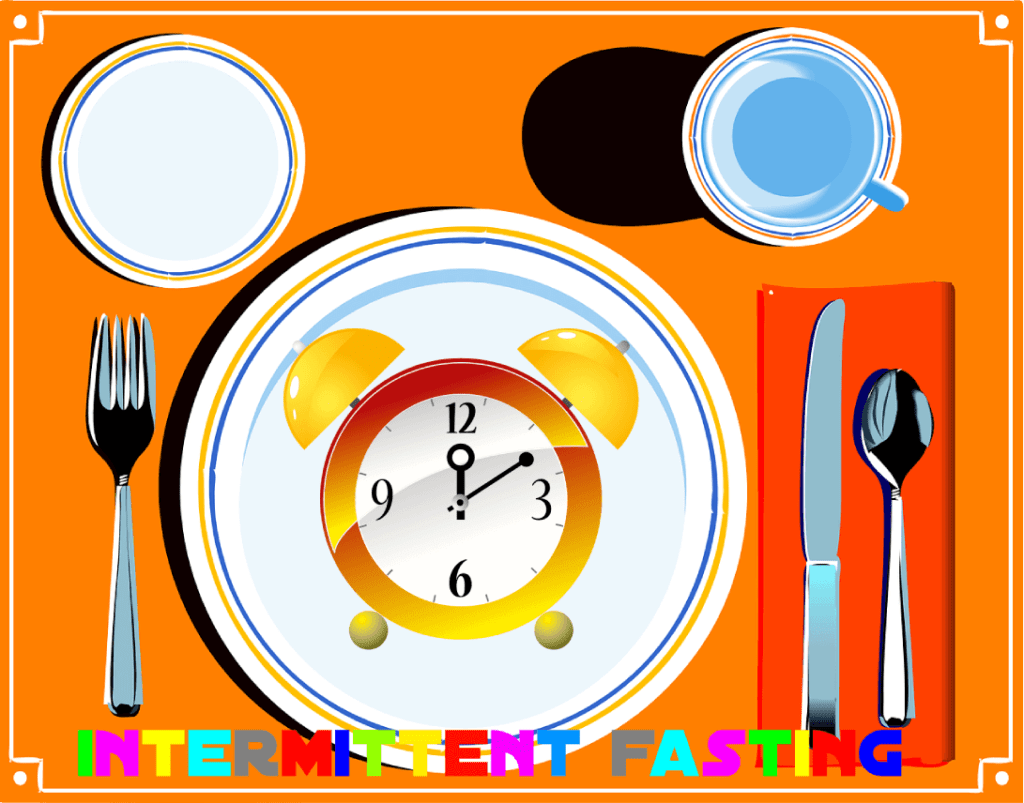Intermittent fasting is an effective weight loss method that doesn’t require counting calories, avoiding certain foods, or even exercising. According to research, the result of intermittent fasting is not only the normalization of hormonal levels, but also a slowdown in the aging process.
Scientists are increasingly saying that intermittent fasting is a much more natural way of eating than eating 3-4 times a day. For thousands of years, people did not have constant access to food, which required them to be able to exist with a periodic feeling of hunger.
There are several schemes and options for intermittent fasting. The most popular, the so-called “16/8” diet, consists of eating only on a schedule from 12 pm to 8 pm hours (or from 10 am to 6 pm) – which means skipping breakfast.

What is intermittent fasting?
Intermittent fasting is a dietary pattern that involves avoiding food regularly for a specified period of time. For example, partial fasting (regimens 16/8 and 14/10) is recommended daily, while complete fasting (24/0) is recommended no more than once a week.
Intermittent fasting works by optimizing insulin production. In fact, the body becomes less sensitive to carbohydrates with a high glycemic index – which reduces the intensity of hunger and normalizes appetite, leading to weight loss.
The physiology of intermittent fasting is based on the effect on the body’s hormonal system. In addition to the effect on insulin, the production of the hormone of hunger and saturation of leptin is normalized. Also, with strength training, growth hormone synthesis increases – it is responsible for burning fat and gaining muscle.
Research and doctor reviews
In 2016, Japanese scientist Yoshinori Osumi was awarded the Nobel Prize in Physiology or Medicine for his study of intermittent fasting. He found that periods of fasting have a positive effect on cell renewal and help slow down the aging process.
Studies show that fasting helps to get rid of defective proteins and organelles – in simple terms, the accumulated “waste”. When energy is low and the cell is hungry, it destroys damaged or old proteins more intensively, making them a source of energy. Which ultimately renews the body.
Intermittent fasting – principles
The essence of intermittent fasting is the periodic refusal to eat food. For example, the 14/10 regimen assumes 14 hours of fasting daily (suitable for beginners), the 16/8 regimen for 16 hours, and the 20/4 regimen for 20 hours of complete fasting each day.
The schedule assumes that most of the fasting period occurs at night when the person is asleep. In addition, it is necessary to refuse breakfast and late dinner – only the use of drinks without calories is allowed. In the remaining time, you can eat without calorie control or proteins, fats and carbohydrates.
Time schedules:
- 14/10 – for beginners
- 16/8 – the most popular scheme
- 20/4 – for advanced
- 24/0 – fasting day once a week
Where to begin?
It is best to start intermittent fasting with the 14/10 scheme. In this case, you can eat only during the period of 10 hours – for example, from 8 am to 6 pm. Note that in order to lose weight, the serving size should not change with this type of intermittent fasting – in fact, you should skip dinner.
After the body gets used to go without food for 10 hours (about 4-5 days), go to the 16/8 scheme – it requires giving up breakfast and dinner. You can eat, for example, from 10 am to 6 pm or from 12 pm to 8 pm. An alternative option for intermittent fasting is a fasting day once a week.

16/8 intermittent fasting
As we said, this type of fasting is the most popular. In order to properly follow this system, the following rules must be observed:
Choose the hours most favorable for food rejection. You can proceed solely from your own preferences and characteristics. So, if you have dinner at 4 pm, then your next meal will be at 8:00 am, and it will be breakfast! Ideal for those who cannot skip their morning meal. Thus, from 8 am to 4 pm you will have a food window. Some experts believe that the most favorable time for eating is from 7 am to 3 pm in the afternoon, since most people are biologically active at this time. However, the time from 10:00 am to 6:00 pm is also considered suitable for this power system. If you can easily do without breakfast, then you can have dinner around 8 pm and the next meal is postponed to 12 in the afternoon.
You decide when you eat. This can be one meal, it can be several, broken down during the entire period. Of course, the best option is to divide your food into 2-3 meals and also add snacks. Then you will have a full breakfast, lunch and dinner. This will stabilize your blood sugar and keep your hunger under control.

Your food should be complete. Your diet should contain lean meat, dairy products, eggs, fish, cereals, vegetables and fruits. Fast carbohydrates, fast food and other unhealthy foods are best avoided. These are empty calories and will not fill you up or provide you with the energy you need.
Contrary to the claims that during 16/8 intermittent fasting you can eat whatever you want and absolutely do not need to monitor calories, you will have to calculate your daily intake and not go beyond it. Very often, the daily calorie intake is exceeded and, instead of losing weight, weight gain occurs. Intermittent fasting is not an uncontrolled intake of food in any quantity, do not forget about that.
If you go in for sports, then the diet on such days must necessarily contain protein and slow carbohydrates. It is allowed to take sports nutrition before training. On normal days, make sure that your diet contains healthy fats, proteins, vegetables. Some experts recommend training on an empty stomach, thereby forcing the body to spend more calories. But here you must first of all listen to your own feelings. If you cannot do the workout on an empty stomach, it is better not to do this and choose a more successful period of time.
Remember to drink enough water while fasting. Your norm is about 10 glasses a day. You can also drink tea without sugar and herbal teas.
The 16/8 fasting system can be combined with other nutritional principles (protein diet, keto diet, vegetarian diet, and others)
Impact on metabolism
Intermittent fasting changes the way metabolism works – instead of processing food, the body switches to using existing reserves. As a result, hormonal levels change, and cells begin to get rid of the accumulated “debris” – this process is called autophagy.
Studies show that with intermittent fasting, the level of growth hormone production (remember that it is responsible for gaining muscle mass and burning fat) increases by about 5 times. At the same time, insulin levels decrease – helping the body to quickly extract energy from fat stores.
Contraindications
Intermittent fasting is prohibited in the presence of cardiovascular insufficiency, hepatitis, cirrhosis, diabetes mellitus, thyrotoxicosis, thrombophlebitis, tuberculosis and hypotension. In addition, it can aggravate problems with the gallbladder, adrenal glands, stomach ulcers and duodenal ulcers.

Intermittent fasting and weight loss
The effects of fasting on weight loss are due to a number of reasons. First, with intermittent fasting, caloric intake is most often reduced. Secondly, the level of glucose in the blood decreases – gradually leading to the normalization of insulin production and stabilization of hunger.
Of particular importance are the hormonal changes mentioned above – low insulin and high growth hormone provoke the release of the powerful fat-burning hormone norepinephrine into the bloodstream. On average, intermittent fasting increases the metabolic rate by 3.6 to 14%.
How much weight can you lose?
A 2014 study found that intermittent fasting resulted in 3-8% weight loss over 3-24 weeks – which is quite good when compared to other diets. Note that the calorie counting method for most people who want to lose weight shows a less noticeable result.
In the same study, it was noted that the waist circumference decreased by 4-7% – indicating a loss of visceral fat. Recall that with obesity, internal fat is actively involved in metabolic processes, directly affecting appetite, provoking overeating and further weight gain.
Animal studies have shown that intermittent fasting prolongs the life of individuals by a significant 36-83%. Markers of various inflammations are reduced (in fact, it is inflammation that leads to the appearance of many chronic diseases), and the risk of developing cancerous tumors decreases.
Also, intermittent fasting increases the production of the hormone BNF (brain neurotropic factor), which, in turn, is responsible for the formation and growth of nerve cells. This hormone appears to help prevent the development of Alzheimer’s disease.
Of particular importance is the effect of intermittent fasting on the body’s defense against type 2 diabetes and insulin resistance – studies have shown that it reduces fasting insulin levels by 20-31%. Among other things, the level of bad cholesterol in the blood is reduced.
Contraindications:
As with any food system, there are pros and cons. When you shouldn’t stick to this nutritional method:
- you if have any immune diseases.
- in case of impaired liver and kidney function, it is not recommended to follow the principles of IF.
- very often complaints of pain in the stomach during fasting are observed, which is associated precisely with the presence of diseases that are not compatible with this food system. It must be remembered that the presence of various diseases of the gastrointestinal tract is a weighty argument not to adhere to such a plan. This is especially true for diseases such as gastritis.
- when leading a very active lifestyle.
- in a state of severe stress, as well as if you have neurosis or insomnia.
You should also not start intermittent fasting if you are sick or simply not feeling well. You can practice this technique only if you are healthy and do not complain about well-being.
It should be noted that for pregnant and lactating women, such a nutritional system is not recommended.
In any case, before making such an important decision, be sure to consult with your doctor in order to eliminate any possible risks.

When to expect the result?
Strictly speaking, intermittent fasting is not a weight loss diet at all, but a way of life. Scientific studies show that intermittent fasting (without changing the caloric intake) leads to a weight loss of 3-8% in 3-24 weeks.
If you want excess weight to go away faster, it is recommended to control calories and the glycemic index of carbohydrates consumed – and also engage in regular cardio training. In this case, the result can be observed already in the second week.
We also remind you once again that intermittent fasting in the 24/0 mode (“fasting day”) can be carried out no more than once a week – and getting out of such fasting requires following instructions. In particular, the first meal should be light enough – for example, fruit and vegetable juices.
Intermittent fasting is a diet that involves intermittent food refusal. It is believed that such a pattern of eating is more natural for the human body than daily meals 3-4 times a day. Ultimately, the body gets the opportunity to use reserves, and the cells of the body are renewed faster.
Does counting calories help lose weight?
| Correct answer "Maybe", because In the long term, it’s a pain in the butt and will create all kinds of unnecessary stress around food – NOT the recipe for sustainable weight management. Not only that, but all calories are NOT created equal | |
| Correct answer "Maybe", because In the long term, it’s a pain in the butt and will create all kinds of unnecessary stress around food – NOT the recipe for sustainable weight management. Not only that, but all calories are NOT created equal | |
| Yes, in the short term, maybe. In the long term, it’s a pain in the butt and will create all kinds of unnecessary stress around food – NOT the recipe for sustainable weight management. Not only that, but all calories are NOT created equal |




